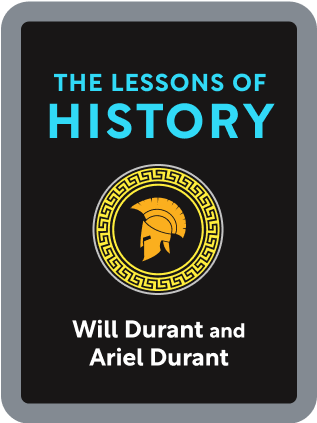

This article is an excerpt from the Shortform book guide to "The Lessons of History" by Will Durant and Ariel Durant. Shortform has the world's best summaries and analyses of books you should be reading.
Like this article? Sign up for a free trial here .
What is the role of economics in society? How has it changed over time? Are there certain things that never change?
Money is vital in shaping the direction of human history. In The Lessons of History, Will and Ariel Durant discuss the role of economics in society throughout history. They identify patterns that provide insights about the profit motive, wealth inequality and redistribution, and socialism.
Read more to learn what history tells us about the role of economics in society.
Viewing History Through the Economics Lens
Much of history can be interpreted sensibly through the economics lens, as a contest among individuals, groups, and states vying for resources and economic power.
- Consider that it was economic ambition, not Helen’s face, that launched a thousand ships.
- The Crusades were attempts to capture trade routes to the East. In turn, America was discovered as a result of the failure of the Crusades.
While it’s possible to identify the role of economics in society throughout history, not all activities are primarily economically motivated – like the teachings of Buddha or the nationalistic fervor of Hitler’s troops. The motives of leaders may be economic, but the passions of the masses may not be.
- But in some cases, military might may cause rather than result from economic operations, like the Bolshevik revolution, or army coups in South American history, or the Mongol conquest of Asia.
The role of economics in society is undeniable. Money is vital in shaping the direction of history. “The men who can manage men manage the men who can manage only things, and the men who can manage money manage all.”
- In history, the bankers rise to lead the economic hierarchy, financing wars and popes, sparking revolutions.
History Lesson 1: Profit Motive
As the Durants examined the role of economics in society, they found that the individual profit motive is vital to spurring productivity. The profit motive sparks the spirit of competition and inventiveness, in a way that works without excessive monitoring, and scales well across an entire growing population.
Every successful economic system must eventually rely on profit incentives. Alternatives like slavery, governmental force, or ideology ultimately prove too unproductive or too unsuccessful to compete against incentive-driven systems.
History Lesson 2: Inequality and Redistribution
The concentration of wealth is a natural result of the concentration of ability.
Some individuals are better equipped than others to survive. This is the natural product of biological variation, which in turn is necessary for evolution and natural selection. And the complexity of civilization magnifies this difference, allowing the exceptional few to wield tools that further enrich themselves.
In a society, the degree of wealth concentration depends on the economic freedom permitted by morals and laws. Democracy, which allows the most liberty, accelerates inequality.
Studying the role of economics in society, the Durants determined that concentration of wealth and redistribution (violent or peaceful) cycle in civilizations like a heartbeat. Concentration may reach a point where the strength in the many poor rivals that of the few rich; then the unstable equilibrium requires either legislation redistributing wealth, or by revolution distributing poverty.
- Athens in 594 BC saw inequality, and statesman Solon instituted reforms to reduce personal debts and establish progressive income tax. The rich protested this as confiscation, but within a generation the consensus was he had saved Athens from revolution.
- The Roman civil wars were motivated in part by uprising of the plebs.
- The Reformation was in part a redistribution of Catholic Church wealth by reducing payments to the church and appropriating church property and revenues.
- In the 1930s-1960s, the United States was able to peacefully redistribute wealth through taxation and social programs.
History Lesson 3: Socialism
Nothing instills the spirit of competition and inventiveness and exhaustive labor like capitalism and self-interest do.
Yet elements of socialism have recurred throughout history. These include state control of commerce, wide government employment, price controls, welfare, progressive taxation, redistribution of wealth, and large public works to reduce unemployment.
- Examples include Sumeria in 2100 BC; Egypt under the Ptolemies (300BC); Rome under Diocletian (AD 301); China in 140 BC and in 1068 (Wang An-shih); the Incas until the 1500s.
Socialism is especially palatable under the threat of security. When external danger mounts, people are willing to forsake internal liberty.
- In Diocletian Rome, the threat of barbarians spurred the society to subsume individual liberty to collective liberty.
- In Communist Russia, the fall of the disgraced Czarist government led to internal disorder and threat of external attack, allowing a socialist system to take hold.
Socialist institutions are commonly overturned when:
- the authorities become corrupt, no longer returning taxes to benefit the populace
- high taxation causes indolence, resentment, and escape of high earners to lower-tax societies
- revolt is spurred by those whose profits are cut short (often the rich, who mobilize the masses on their behalf)
- disasters (natural and manmade) cause upheaval and discontent
In the modern-day, communism has taken on a capitalist flair to stimulate productivity. Inversely, capitalist societies have taken on socialist programs to curb discontent with inequality. And so capitalism and communism look more like each other than they did decades past.
The patterns that the Durants identified in their research help us understand the role of economics in society over time and today.

———End of Preview———
Like what you just read? Read the rest of the world's best book summary and analysis of Will Durant and Ariel Durant's "The Lessons of History" at Shortform .
Here's what you'll find in our full The Lessons of History summary :
- What we can learn from studying 5,000 years of history
- How human nature hasn’t changed over thousands of years
- Why all civilizations, including ours, fall, and why we shouldn’t cry about it






